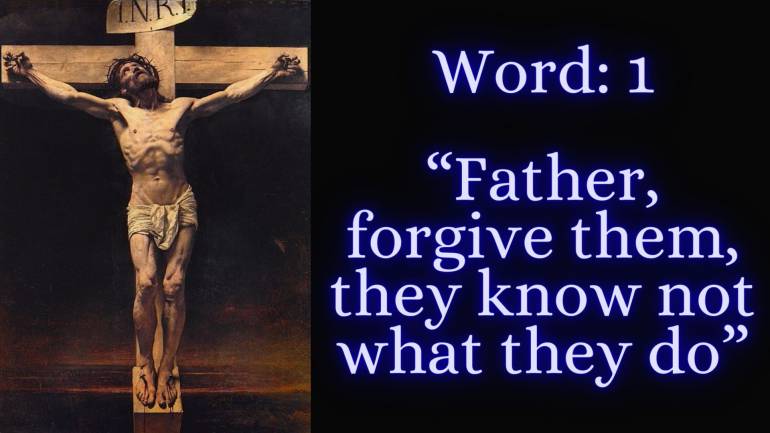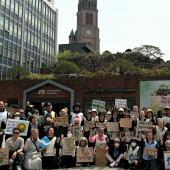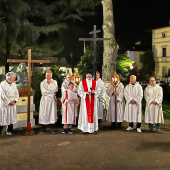The SEVEN LastWords of Jesus. Word: 1 - “Father, forgive them, they know not what they do”

A. Text: Luke 23: 33-34a
“When they came to the place called the Skull, they crucified him and the criminals there, one on his right, the other on his left. Then Jesus said, “Father, forgive them, they know not what they do.”
B. Exegesis:
1. “forgive them …”
On the cross, Jesus utters forgiving words. In the Sermon on the Plain, He preached, “Love your enemies. Do good to those who hate you” (6,27-29). He now walks the talk.
These forgiving words constitute a directive for the gracious treatment of one’s enemies. Many would come after Jesus, beginning with Stephen, who would find hope in facing unjust brutality by repeating the prayer of the Lucan Jesus, “Then he fell to his knees and cried out in a loud voice, ‘Lord, do not hold this sin against them’; and when he said this, he fell asleep” (Acts 7,60). Hence, the Lucan crucifixion is a moment of grace through and by Jesus.
2. “… they know not what they do”
It is hinted that the Jewish chief priests and scribes acted ‘out of ignorance.’ It is reiterated when Peter addressed the crowds at the Temple: “Now I know, brothers, that you acted out of ignorance, just as your leaders did” (Acts 3,17).
Luke also stresses ‘an active Jewish role’ in the death of Jesus in Acts:
i. 2,36: Peter to “devout Jews from every nation under heaven staying in Jerusalem” during Pentecost - “Therefore let the whole house of Israel know for certain that God has made him both Lord and Messiah, this Jesus whom you crucified.”
ii. 4,10: Peter to the Sanhedrinists - “Then all of you and all the people of Israel should know that it was in the name of Jesus Christ the Nazorean whom you crucified, whom God raised from the dead …”
iii. 5,30: Peter and the Apostles to the Sanhedrinists - “The God of our ancestors raised Jesus, though you had him killed by hanging him on a tree.”
iv. 7,52: Stephen to the Sanhedrinists - “Which of the prophets did your ancestors not persecute? They put to death those who foretold the coming of the righteous one, whose betrayers and murderers you have now become.”
v. 10,39: Peter at Cornelius’ house referring to the Jews - “We are witnesses of all that he did both in the country of the Jews and (in) Jerusalem. They put him to death by hanging him on a tree.”
vi. 13,27-29: Paul to the Jews at the synagogue of Antioch in Pisidia - “The inhabitants of Jerusalem and their leaders failed to recognize him, and by condemning him they fulfilled the oracles of the prophets that are read sabbath after sabbath. For even though they found no grounds for a death sentence, they asked Pilate to have him put to death, and when they had accomplished all that was written about him, they took him down from the tree and placed him in a tomb.”
In relation to these citations, how do we understand the word on the cross now? It constitutes a more humane understanding of the complex responsibilities for the death of Jesus.
C. Application:
3. On the cross, we see different portraits of Jesus like praying Jesus. Now we see a forgiving Jesus. Yes, He forgives His enemies.
This is quite an ‘unusual’ picture by worldly standards, since what we may expect from a man hung on a cross is usually either blasphemy or a curse on those, responsible for his fate. Instead, we find on the cross a forging Heart.
It is also a ‘unique instance’ in Jesus’ life. Did He go about forgiving His enemies during His public life? He had a way of dealing with them with a view of converting them and making them His friends.
How did Jesus deal with His enemies? First, He never refused to dialogue with them. He always accepted their invitation to dine with them. This table fellowship was a splendid occasion for Him to dialogue with them. Without dialogue, there is no recognition of faults; without recognition of faults, there is no repentance; without repentance, there is no reconciliation.
Did Jesus meet with success? At times, He succeeded. Some enemies were converted to and by Him. For example, we may cite Nicodemus, a ruler of the Jews and Sanhedrinist.
How about others? For Jesus it was a risk worth taking. So He tried but failed at times. His enemies remained so; they stubbornly refused to be converted. Those, Jesus treated with harsh words, once again for their conversion. Read Luke 11,37-54: “You fools … Woe to you Pharisees! … Woe to you scholars of the Law! …”
Finally, the enemies put Jesus to death. But, while dying on the cross, He did not hesitate to ask the Father to forgive them giving them the benefit of the doubt, for they did not ‘fully’ know what they were doing.
4. Now Jesus wants us, His disciples, to forgive all our enemies – enemies in our personal, public and professional life – just as He did. What a challenge! Can we easily follow the way of Jesus in dealing with our enemies – that of dialogue, self-acknowledgment, repentance and reconciliation? Does this process not waste a lot of our time and test our patience? On top of it, what guarantee do we have that we might succeed? Is the risk worth taking? These questions could tantalize our minds, much before we start the process.
Furthermore, our instinct is to bump off the enemy outright. That is the easiest and frugal way. In this regard, let me quote for example, The Count of Monte Cristo (French: Le Comte de Monte-Cristo), 1844, an adventure novel by French author Alexandre Dumas.
This literary classic revolves around a man who is falsely accused of treason, wrongfully imprisoned without trial in a grim island fortress, escapes from jail, acquires a fortune, and sets about exacting revenge on those responsible for his imprisonment – his jealous rival, envious crewmate and double-dealing magistrate. His plans have devastating consequences for both the innocent and the guilty.
That was the easiest way, but not the way of Jesus and hence, it can never be the way of His disciples. We are thus called by Him to follow the harder, costly, wasteful and risky path of dialogue, repentance and reconciliation. Is He not asking too much from us, His ordinary disciples? On the other hand, if we want to kill the enemy, then we come down to his level and there is no difference between us Christians and the rest of humanity.
This life of Jesus is the ideal. How much is my daily life closer to or distant from the ideal? The Lord may wish to stretch His hands to raise me to His level. I may weep for Him and admire Him on Good Friday. Yet I may wish to remain where I am – the part of the truncated and unredeemed humanity.
5. The Good Friday of every year would be etched in the minds of every disciple of Jesus. It is because it was on the night of Good Friday that a unique disciple of Jesus commended his spirit to the Father. Jesus died before the Jewish Sabbath began on Friday sunset. This disciple rested his life on the palms of his Creator during the Jewish rest after the sunset.
This unique disciple of Jesus, His Grace Nicholas Marcus Fernando, the seventh Metropolitan Archbishop of Colombo, trekked the path of Jesus to the end and so in him everyone found a forgiving heart. Some failed him viciously, bamboozled him profusely, and criticized him maliciously when in office. Some backstabbing avatars of Brutus did not spare him even after he retired from the venerable office in such a dignified manner, albeit prematurely.
But this man of God from Little Rome forgave all of them generously and without delay and later, moved with them freely without being prejudiced or cynical. He could win many hearts, it is not an exaggeration to say, through dialogue. Hence, it is very fitting and memorable that he left his life principle in the arms of the Lord on a Good Friday. Ultimately, God planned that when we looked up to the crucified Christ on Good Friday year after year, we would also commit to memory ad infinitum His model disciples of forgiveness, like the one-time saintly sage and silent song of ‘Emmaus’, His Grace Nicholas Marcus Fernando.
Radio Veritas Asia (RVA), a media platform of the Catholic Church, aims to share Christ. RVA started in 1969 as a continental Catholic radio station to serve Asian countries in their respective local language, thus earning the tag “the Voice of Asian Christianity.” Responding to the emerging context, RVA embraced media platforms to connect with the global Asian audience via its 21 language websites and various social media platforms.














